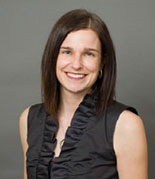Dr. Kelly O’Brien and Dr. Patty Solomon
Leading the way in HIV Rehabilitation in Canada
University of Toronto and McMaster University
Thanks to significant research efforts to find treatments, people are now living longer and healthier lives with HIV. But living with HIV is still characterized by periods of good health that can be interrupted by disability or illness. Rehabilitation — broadly defined as services/providers that address or prevent symptoms, activity limitations or social participation restrictions — plays an important role in helping patients return to good health and improve their quality of life. Yet, as it relates to people living with HIV, there is a dearth of information on the rehabilitation requirements of patients, effects of living with HIV for long periods of time and rehabilitation service use and needs in Canada.

Dr. Kelly O'Brien
Dr. Kelly O’Brien (Assistant Professor, Department of Physical Therapy, University of Toronto) and Dr. Patty Solomon (Professor and Director, School of Rehabilitation Science, McMaster University) in collaboration with the Canadian Working Group on HIV Rehabilitation (CWGHR) are working to change this, as they simultaneously establish Canada as a leader in HIV disability and rehabilitation.
As two pioneers in their field, Dr. O’Brien and Dr. Solomon have had to approach HIV rehabilitation from every angle. Co-led by the CWGHR and funded by the CIHR HIV/AIDS co-morbidities initiative, Drs. O’Brien and Solomon and an extensive team of researchers, clinicians and people living with HIV/AIDS are compiling a comprehensive profile of co-morbidities, disability, rehabilitation services use and living strategies among adults living with HIV in Canada. This study will provide invaluable information about the current status of HIV disability and rehabilitation. This survey builds on the work of Dr. O’Brien’s post-doctorate (with Dr. Solomon) where she developed the HIV Disability Questionnaire, a 70 item self-administered questionnaire that measures the presence, severity and episodic nature of disability for adults living with HIV across domains including physical and mental health, uncertainty about future health, and social inclusion.
Those living with HIV into their later years face unique challenges and may require rehabilitation and support services that focus specifically on their needs. Dr. Solomon and Dr. O’Brien and their colleagues conducted a study looking into HIV and ageing. The results illuminated issues around uncertainty of future health, social inclusion and the gender related differences in those ageing with HIV.

Dr. Patty Solomon
Together, Solomon and O’Brien have conducted a knowledge synthesis of evidence on rehabilitation interventions for people with HIV as well as evidence from other chronic conditions commonly experienced by older adults with HIV. They combined this evidence to develop evidence informed recommendations on rehabilitation for older adults living with HIV while integrating people living with HIV and clinician experiences. These recommendations will help guide future practices for rehabilitation professionals.
The other key aspect of Dr. Solomon and Dr. O’Brien’s work revolves around education and knowledge translation. Because rehabilitation of people living with HIV is an emerging area, many rehabilitation professionals are often not aware of patient’s unique needs. The CWGHR developed a comprehensive evidence-informed online guide to HIV rehabilitation for rehabilitation professionals. Dr. Solomon evaluated its uptake by rehabilitation professionals and received feedback from participants. Results showed that participants felt more knowledgeable and comfortable working with people living with HIV. From past research, Dr. Solomon has seen how important firsthand experience is for health sciences students: “I got a small educational grant to train people living with HIV to be co-facilitators with faculty in small groups of health sciences students,” explains Solomon. “The impact on the students’ learning was profound and they gained a much deeper understanding of some of the challenges of living with a stigmatized illness and of social determinants of health.”
Knowledge translation is critical for Dr. Solomon and a reason why she continues her work in the field; “Facilitating a broader understanding of the needs of people living with HIV and ensuring that their voices and preferences are incorporated into the research is tremendously rewarding. I enjoy helping other health professionals understand the value of an interprofessional approach to care. Our partnerships with AIDS Service Organizations and the CWGHR have been important in our knowledge translation efforts,” says Dr. Solomon.
Dr. O’Brien has been forging a relationship between Canada and the UK through the Canada-UK HIV and Rehabiltiation Research Collaborative (CUHRRC). Its goal is to build partnerships and facilitate knowledge transfer and exchange among people living with HIV, researchers, clinicians, and other stakeholders in Canada and the UK with an interest in HIV and rehabilitation research. In the UK, rehabilitation services for those living with HIV are more firmly established compared to Canada. Dr. O’Brien believes that much can be learned by sharing information; “Forming partnerships and exchanging knowledge with others in countries with individuals experiencing similar types of disability is essential,” explains Dr. O’Brien.
The Canadian Association for HIV Research (CAHR), the CIHR HIV/AIDS Research Initiative, the Canadian Foundation for AIDS Research (CANFAR), the CIHR Canadian HIV Trials Network (CTN) and the Canadian HIV Vaccine Initiative (CHVI) Research and Development Alliance Coordinating Office (ACO) would like the congratulate Dr. Solomon and Dr. O’Brien on their contributions to our understanding of HIV in Canada. Their work is part of a larger Canadian research effort that is making a difference in the lives of those affected by HIV in Canada and around the world.
- Date modified: